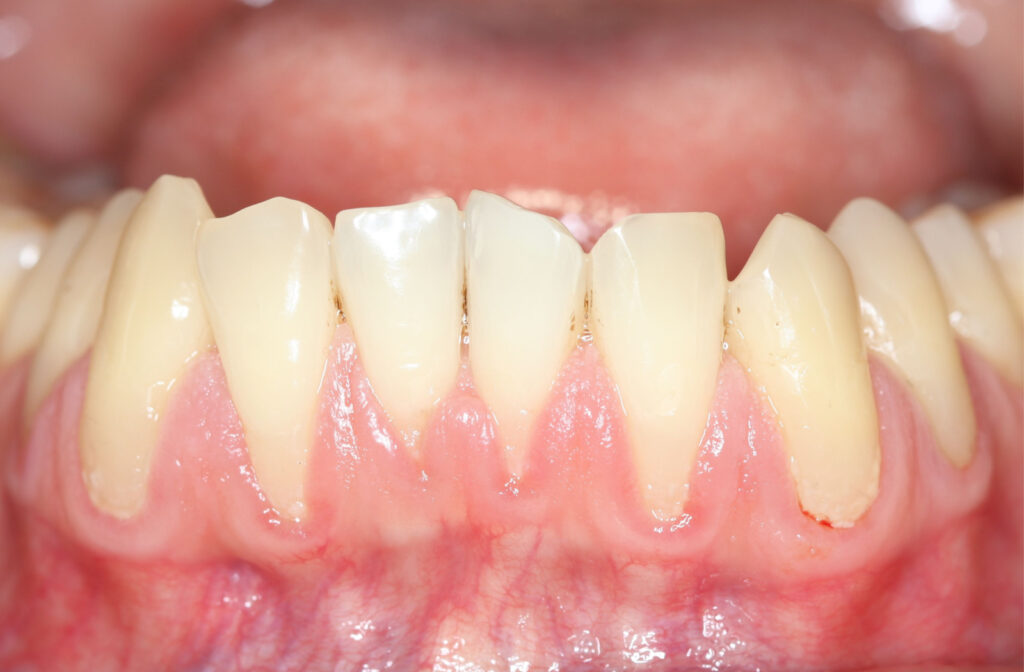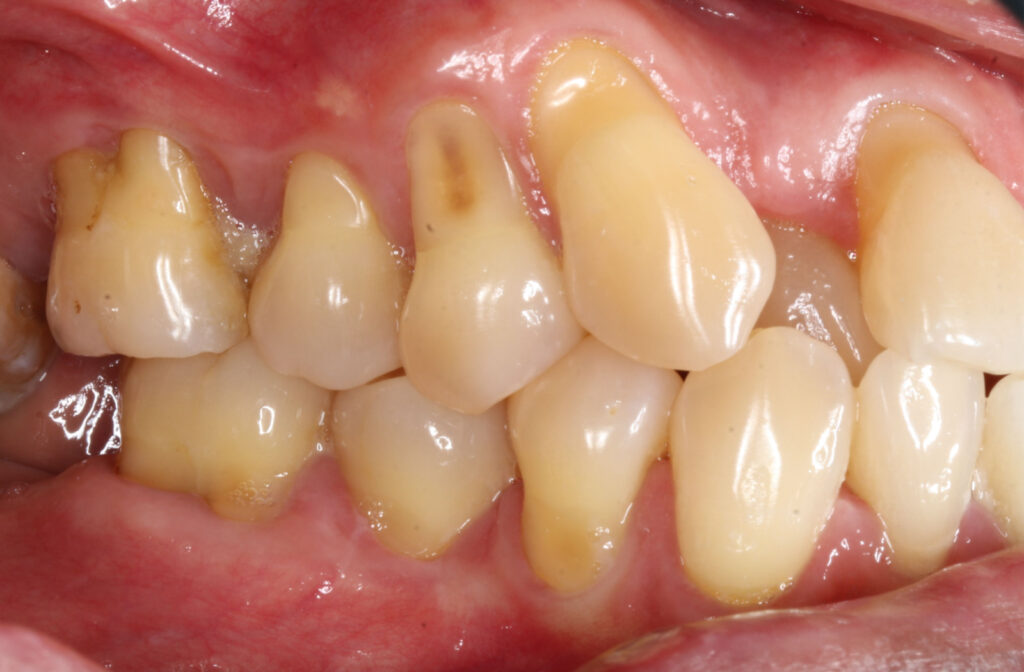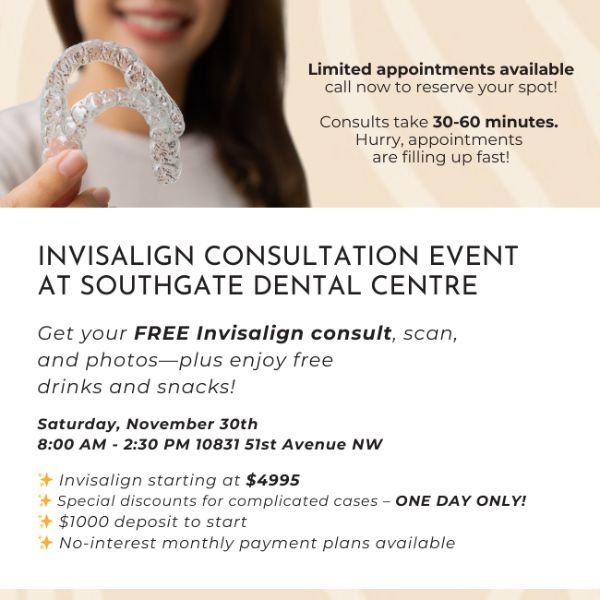Gum recession is a common dental issue. Caused by a combination of lifestyle, environmental, and hygiene factors, this condition leads to the gums pulling away from the teeth. Gum recession can create pockets for bacteria to breed and thrive, which can lead to all kinds of dental conditions.
But how do you prevent gum recession? We have 10 tips for you:
- Practice proper oral hygiene
- Don’t brush your teeth too hard
- Address bruxism
- Eat a balanced diet
- Avoid tobacco use
- Manage stress
- Stay hydrated
- Avoid lip or tongue piercings
- Protect your mouth from trauma
- Visit your dentist regularly
By practicing proper oral hygiene, changing some lifestyle factors, and following a healthy diet, you can keep your teeth and gums strong while promoting a healthy immune system. It’s also essential to schedule regular dentist visits to help stay on top of your oral health, including gum health.
1: Practice Proper Oral Hygiene
When it comes to avoiding gum recession—or most oral conditions, for that matter—it starts with your oral hygiene. Following a proper routine for taking care of your teeth, gums, and mouth is essential to keeping them healthy. It helps to:
- Brush your teeth for two minutes. Doing this two times a day helps remove food particles and keeps your teeth healthy. Try using fluoride toothpaste to help keep the surface of your teeth strong.
- Floss at least once a day, making sure you reach between all teeth and where they meet the gums.
- Use antibacterial mouthwash once a day to kill any residual germs.
This helps keep bacteria and food particles out of your mouth while promoting healthy teeth and gums.
2: Don’t Brush Your Teeth Too Hard
Brushing your teeth is essential for maintaining good oral hygiene, but it’s important to strike the right balance to avoid potential issues.
Brushing your teeth too hard can actually lead to gum recession.
To prevent this, consider using a power toothbrush, as its controlled motion can help prevent excessive pressure. You can also opt for a soft toothbrush, as it’s less likely to cause damage. It’s advised to avoid using medium or hard toothbrushes, which can be abrasive to the delicate gum tissue.
Proper brushing technique is equally vital—gentle, small movements are recommended over vigorous, long scrubbing motions. By paying attention to these factors, you can effectively maintain your oral health without compromising your gum health.
3: Address Bruxism
Bruxism is the clinical term for the involuntary habit of grinding your teeth. Usually, this occurs during sleep, but it can still happen during the day. While mild cases may not cause any other problems, a severe case of bruxism can lead to long-term damage to the jaw and teeth as repetitive pressure begins to wear them down.
Over time, this habit can lead to damage to your teeth and can cause them to shift aside or out of place. This can eventually cause gum recession, making it essential to work closely with your dentist to determine what may be causing your bruxism.
5: Follow a Balanced Diet
You may have heard it before: a properly balanced diet is the foundation of your overall health. This is especially true for your mouth. If you’re lacking in any vitamins or nutrients, your body may not be able to recover as quickly as it could, which can contribute to some conditions developing.
When focusing on taking care of your oral health, it may help to include some of the following in your diet:
- Fatty fish, like salmon
- Dairy products
- Fruits and vegetables
- Chicken and other poultry
- Nuts and seeds
Incorporating these into your diet can provide your teeth and gums with what they need to stay healthy and strong.
It can be extremely helpful to avoid sugary foods and drinks.
These foods and drinks—like soda and candy—can make many forms of gum disease worse. But they can also lead to the growth of bacteria in your mouth, putting you at a higher risk of tooth decay or cavities. While you don’t need to cut them out completely from your diet, it helps to only eat and drink them in moderation.
5: Quit—or Don’t Start—Using Tobacco
When smoked, tobacco usage leads to a weakened immune system and damage to the mouth. Chewed tobacco is terrible for causing gum recession and oral cancer. Tobacco use significantly increases your chances of developing gum disease, which often causes gum recession. Tobacco usage causes inflammation in the gums and makes it harder for them to heal, which can make this condition worse.
6: Manage Your Stress
We’ve all experienced stress at some point in our lives, but did you know that stress actually weakens the immune system? While gum recession itself isn’t caused directly by stress, the two are often related.
When going through a stressful period, many of the habits people follow can often lead to gum damage. Whether it’s brushing your teeth too hard, grinding teeth, drinking excessively, or turning to tobacco or other substances, many coping mechanisms people often use can lead to damage to the teeth and gums.
It’s important to try and regulate your stress and do what you can to reduce stress levels in a healthy way. Whether it’s through meditation, practicing a hobby, or visiting a friend for advice, reducing your stress levels can help you keep your mouth strong by avoiding poor coping mechanisms.

7: Stay Hydrated
Regularly drinking water helps keep up the amount of saliva in your mouth and to wash away food particles and bacteria, which can reduce your risk of gum disease.
Water can also help keep your immune system strong, along with keeping your gum tissue moisturized and promoting saliva production. The saliva production keeps the acid levels of your mouth at an optimal level, which can avoid bacterial growth!
8: Avoid Tongue or Lip Piercings
Though personal style may have you wanting to keep your piercings in, they may actually be causing damage to your gums. Tongue or lip piercings often have an anchor or stud keeping them attached, and this piece of plastic or metal can rub against the gums over time,
This can lead to irritation or inflammation, which can contribute to gum recession. If you have an oral piercing, it may be beneficial to take it out—or at least consult with your dentist to determine whether or not it could be contributing to your gum issues.
9: Protect Your Mouth
Trauma is one factor that can often be overlooked when thinking about gum disease or gum recession. If you regularly engage in sports or work in an environment where you’re at risk of something hitting your face, it may be helpful to look into mouthguards.
By protecting your teeth and gums when performing high-impact activities, you can lessen the risk of trauma causing your teeth to shift out of place. Trauma alone can cause the gum to be damaged, resulting in recession.
10: Regularly Visit Your Dentist
At the end of the day, there’s one important step you can take to help keep your gums healthy: regularly visiting your dentist. Experienced professionals can perform a proper examination of your mouth during your next visit and provide you with up-to-date advice on keeping your gums and teeth strong.
Comprehensive Dental Care
At Southgate Dental Centre, we take pride in helping our patients find their smiles. To speak with a caring and experienced dentist today, request an appointment with us!



